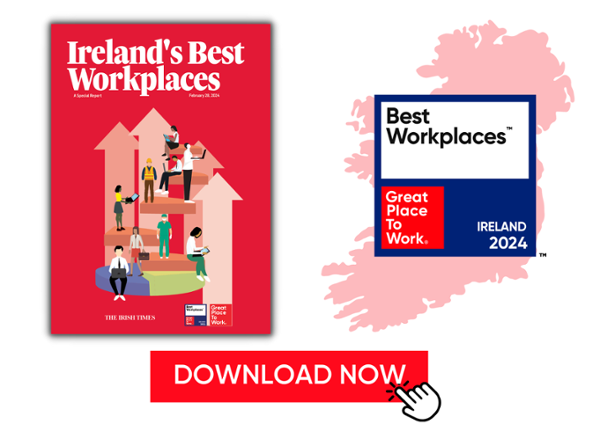Research conducted by Great Place to Work found that 7 out of 10 people believe that managers play favourites at work. This same research also found that just 47% of employees think that promotions are fairly awarded at their workplaces. In contrast, of over 20,000 employees surveyed across Ireland’s Best Workplaces, 75% agree that promotions in their organisations go to those who best deserve them, and 74% agreed managers avoid playing favourites. So why is the contrast so pronounced? How are Great Workplaces ensuring a fair process for promotions? Keep reading to find out.
1. Care about employees' personal growth
Core is a perfect example of this philosophy in action. They not only offer excellent professional development opportunities but look to equip their employees with the personal tools needed to thrive in the modern world. Core employees can avail of psychological flexibility training through a number of practical and experiential exercises. The training is designed to improve wellbeing, resilience, and behavioural effectiveness at Core. Here is what the organisation has to say about it:
“A growing body of research has established that psychological health is one of the most important factors in job performance. Numerous studies have shown that psychological wellbeing and performance improve through developing psychological flexibility.”
This along with their mental health and wellbeing training from I Am Here, has ensured that Core employees are enabled to support one another and ask for help when needed, avoiding burnout and setting them up for success at a very challenging time.
Hear more on Core's policies from HR Director Catherine Fitzgibbon in The Red Cube podcast 👇

2. Give people the tools and opportunities to own and define their professional future, rather than deciding it for them
Danone Specialised Nutrition offers a perfect case study here. Rather than offering prescriptive development opportunities, their approach is to identify what the individual needs in order to grow and learn, matching training provisions against those needs. Access to support and opportunities is provided to every individual.
Employees have access to a career portal providing a wealth of information on job families, career stories and tools. “Growing in Danone” runs once or twice a year and is dedicated to helping employees understand more about their development options. Employees can also access shared resources on a range of topics that inform career and development.
3. Don’t limit the growth of people by matching their background with the organisational chart
Instead, they promote and train for career changes based on contributions and potential, regardless of educational credentials, tenure, or experience. BBraun Medical Ltd. offers a perfect example of the great things that can happen when employee growth is supported in this way. Their excellent track record of promoting internally continued in 2020, with 12 internal promotions occurring. One current senior manager even began life with the company as an intern.
4. Create opportunities for exposure to senior leadership for everyone
Global Shares are an organisation that excels in this area, with their employees having ample opportunity to spend time with leaders through both formal and informal mechanisms. For example, their monthly show and tell sessions cover all company updates and give senior management an opportunity to speak directly with employees. The company also run bi-annual “Ask Me Anything” webinars to empower each employee to reach leaders and to be able to get feedback on subjects that are important to them.
5. Encourage cross-functional working and career change in a new department
LotusWorks offers a perfect example of how to encourage cross-functional working with a view to developing employees. They provide employees with cross-functional training and provide opportunities for employees to undertake project assignments that release them from their current roles for a period. The quote below captures the organisation’s perspective on why cross-functional working opportunities are important: “Having these opportunities available to staff outside of their normal roles can offer a chance to try something new, develop skills to advance their career and/or develop specialist skillsets.”

6. Maximise human potential
Great Workplaces look to draw out the uniqueness of their employees to assist them in discovering their talents. For example, Esri Ireland's team undertook the Gallup’s Strengths Finder assessment, which identifies 5 areas where each employee excels and provides an explanation of ways to apply these skills. This allows employees to develop their talents and means that the organisation is aware of the different strengths each employee brings to the company, allowing them and their Career Coach to focus on these by building on strengths.
Esri Ireland also adopts the 13 behaviours of High Trust Leaders from Franklin Covey. They use this framework to measure a combination of character and competence type behaviours for employees. Furthermore, career development programs are designed to create learning pathways to develop future careers and growth aspirations, so that everyone working at Esri Ireland had the opportunity to be their best self.
Final Word
In a world where 53% of the general public believe promotions are unfair, it is Great Workplaces that have established themselves as employers with transparent and inclusive promotions processes. The examples we have highlighted above, with thanks to our clients, offer not only opportunities for promotions to go to those who deserve them most, but foster cultures of trust and fairness. That is what Great Workplaces are built on.
To learn more about the Great Place to Work Programme, get in touch with our team today.

About Great Place to Work®
Great Place to Work® is the global authority on workplace culture. We help organisations quantify their culture and produce better business results by creating a high-trust work experience for all employees. We recognise Great Place to Work-Certified™ companies and the Best Workplaces™ in more than 60 countries.
To join the thousands of companies that have committed to building high-trust company cultures that help them attract, retain and take care of their people, contact us about getting Certified today.
